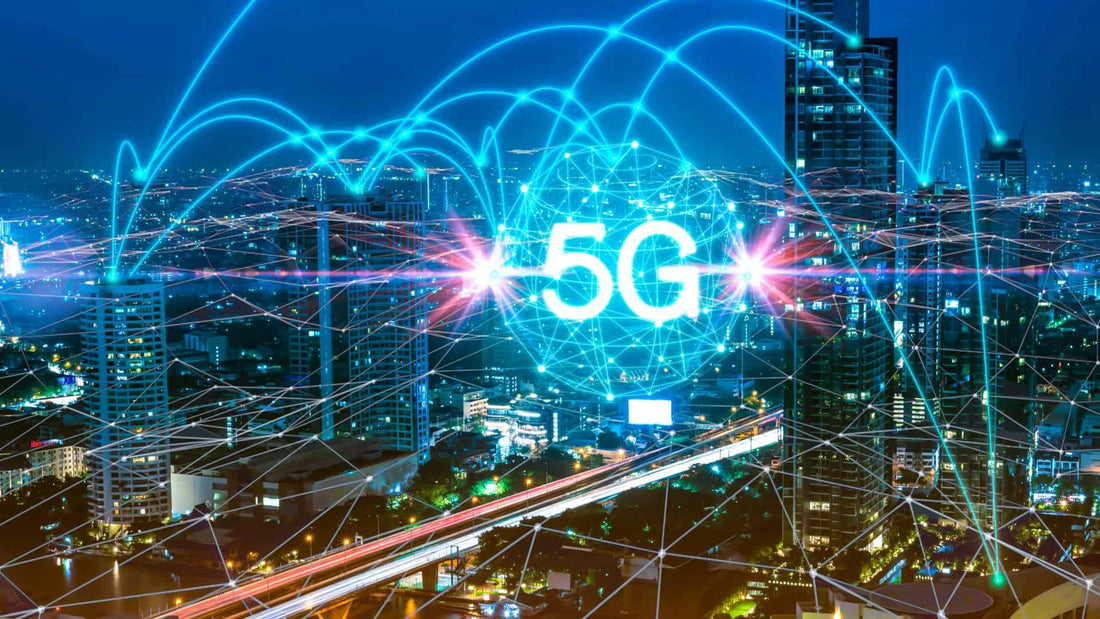
The Impact of 5G on Smart Cities: Enabling Connected and Sustainable Urban Living
Share
The advent of 5G technology is set to revolutionize the concept of smart cities, transforming urban living through enhanced connectivity, efficiency, and sustainability. As cities around the world grapple with challenges like population growth, traffic congestion, pollution, and resource management, 5G provides the technological backbone necessary to develop innovative solutions. This article explores how 5G is enabling connected and sustainable urban living, highlighting its impact on key aspects of smart cities.
What is 5G and Why Does it Matter?
5G, the fifth generation of wireless technology, offers unprecedented speed, lower latency, and the ability to connect a massive number of devices simultaneously. Compared to its predecessor, 4G, 5G delivers data speeds up to 100 times faster, with latency reduced to as low as 1 millisecond. This leap in technology is not just about faster internet—it is about enabling new possibilities in connectivity and data exchange that are crucial for the development of smart cities.
Transforming Urban Infrastructure
5G technology plays a pivotal role in transforming urban infrastructure, making cities more efficient and responsive to the needs of their residents:
- Smart Traffic Management: With 5G, cities can implement advanced traffic management systems that use real-time data to optimize traffic flow, reduce congestion, and improve safety. Connected vehicles, sensors, and traffic lights can communicate seamlessly, allowing for dynamic adjustments based on current conditions. This not only reduces travel time but also lowers emissions and enhances road safety.
- Intelligent Public Transportation: Public transportation systems can benefit from 5G by becoming more integrated and responsive. Real-time tracking of buses, trains, and other transit options allows for better coordination, reducing wait times and improving overall efficiency. Passengers can receive up-to-date information on delays, routes, and schedules, enhancing their commuting experience.
- Smart Energy Grids: 5G enables the development of smart energy grids that can dynamically balance supply and demand, integrate renewable energy sources, and reduce energy waste. Sensors and IoT devices can monitor energy consumption in real-time, allowing for more efficient distribution and the identification of areas where energy savings can be achieved.
- Water and Waste Management: Smart cities equipped with 5G can deploy sensors to monitor water quality, detect leaks, and optimize waste collection routes. This leads to more sustainable resource management, reducing waste and conserving essential resources like water.
Enhancing Public Safety and Security
5G technology significantly enhances public safety and security in smart cities:
- Real-Time Surveillance: High-definition cameras and sensors connected via 5G can provide real-time surveillance and monitoring across cities. This helps law enforcement and emergency services respond more quickly to incidents, improving overall public safety. Additionally, AI-powered analytics can identify potential threats or suspicious activities, allowing for proactive measures.
- Emergency Response Systems: 5G-enabled communication networks ensure that emergency response teams can coordinate more effectively during crises. Real-time data sharing between first responders, hospitals, and control centers can save lives by reducing response times and improving the allocation of resources.
- Disaster Management: In the event of natural disasters, 5G networks can support real-time communication and data sharing, enabling authorities to monitor the situation, coordinate evacuations, and deliver timely information to the public. Drones and autonomous vehicles, powered by 5G, can assist in search and rescue operations and deliver essential supplies to affected areas.
Fostering Sustainable Urban Living
Sustainability is at the heart of the smart city concept, and 5G technology is a key enabler of greener, more sustainable urban living:
- Environmental Monitoring: 5G allows for the deployment of a vast network of sensors that can monitor environmental conditions such as air quality, noise levels, and temperature. This data can be used to identify pollution hotspots, enforce environmental regulations, and promote healthier living environments.
- Smart Buildings: Buildings equipped with 5G-connected sensors can optimize energy use by adjusting lighting, heating, and cooling systems based on occupancy and usage patterns. This reduces energy consumption and lowers the carbon footprint of urban areas. Additionally, smart buildings can enhance the comfort and well-being of occupants through personalized environmental controls.
- Promoting Green Mobility: 5G supports the development of electric and autonomous vehicles, which are critical components of sustainable urban transportation. Connected vehicle networks can optimize routes, reduce energy consumption, and facilitate the widespread adoption of electric vehicles by integrating charging infrastructure with the grid.
- Citizen Engagement: 5G-enabled platforms allow city residents to participate more actively in sustainability initiatives. Through mobile apps and online portals, citizens can access information on recycling, energy conservation, and public transportation, as well as report issues like littering or energy wastage, fostering a more engaged and environmentally conscious community.
Challenges and Considerations
While 5G offers significant benefits for smart cities, there are challenges and considerations that need to be addressed:
- Infrastructure Investment: The deployment of 5G requires substantial investment in infrastructure, including the installation of small cells, fiber-optic networks, and edge computing facilities. Cities need to collaborate with telecom providers and other stakeholders to ensure the successful rollout of 5G networks.
- Data Privacy and Security: The increased connectivity and data exchange enabled by 5G raise concerns about data privacy and cybersecurity. Cities must implement robust security measures to protect sensitive data and ensure that smart city systems are resilient against cyber threats.
- Digital Divide: Ensuring equitable access to 5G technology is essential to prevent the digital divide from widening. Cities must work to provide affordable access to 5G services and ensure that all residents can benefit from the advancements in smart city technology.
- Environmental Impact: While 5G can promote sustainability, the energy consumption associated with the deployment and operation of 5G networks must be carefully managed. Sustainable practices in the development and use of 5G technology are crucial to minimizing its environmental footprint.
The Future of 5G-Enabled Smart Cities
As 5G technology continues to evolve, its impact on smart cities will only grow. Future innovations may include the integration of AI and machine learning with 5G networks, enabling even more intelligent and autonomous urban systems. The development of smart grids, advanced healthcare solutions, and enhanced public services will further solidify 5G's role in shaping the cities of tomorrow.
Ultimately, the success of 5G-enabled smart cities will depend on collaboration between governments, industry, and citizens. By working together, stakeholders can create connected, sustainable urban environments that enhance quality of life for all residents while addressing the challenges of the 21st century.
Conclusion
5G is a game-changer for smart cities, providing the connectivity and data capabilities needed to build more efficient, responsive, and sustainable urban environments. From transforming infrastructure and enhancing public safety to promoting sustainability and engaging citizens, the impact of 5G on smart cities is profound. However, realizing the full potential of 5G will require careful planning, investment, and a commitment to addressing the ethical and practical challenges that come with this powerful technology. As cities around the world embrace 5G, they are laying the foundation for a future where technology and sustainability go hand in hand, creating smarter, greener, and more livable urban spaces.
